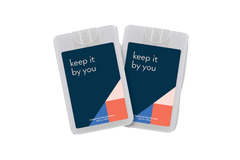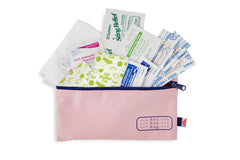Greenwashing–the exaggeration of a company’s environmental practices–can make it tricky to make informed and more environmentally-responsible decisions when shopping for new clothes, bags or other accessories.
To cut through the noise, we’re sitting down with sustainable fashion expert Laura Harmstorf to get her top tips on shopping in more environmentally friendly ways.
Kibou: Let’s start with the basics. How do you define sustainability?
Laura H: Sustainability means the responsible use of resources along the entire value chain, all the way from development, to creation, up to the delivery to our doorstep.
To consume responsibly we need to be aware and educate ourselves on what raw materials are used, where they come from, and how they are processed. It is with this awareness that we, as consumers, gain the power to make a positive difference.
What do you look for when shopping for clothes or accessories?
When I am shopping for new clothing or accessories, I always read the material description first.
Helpful certifications to look for:
GOTS (Global Organic Textile Standard)
GRS (Global Recycled Standard)
Sustainable fabrics: Tencel, linen, bamboo and organic cotton are more sustainable.
These materials are better for the environment because they are produced using fewer resources than conventional fabrics.
For those of us who love getting new things, what advice do you have?
Ideally before purchasing anything new, we should ask ourselves if we really need this item. We all consume too much and fast fashion is causing a major environmental crisis.
If you decide that you want something new, you should check if you can find it secondhand.
Large online retailers have now added a secondhand category to their online shops. Thrift stores and consignment shops are always worth a look, too.  I also find it super helpful to store clothing and accessories away that I am tired of wearing in plastic bins in our basement. Then after a while I rotate my wardrobe and am usually surprised what I own and that it feels new again. I do the same with my kids’ toys, and it also works very well. They are always excited to play with things again, after not having seen them for a few months.
I also find it super helpful to store clothing and accessories away that I am tired of wearing in plastic bins in our basement. Then after a while I rotate my wardrobe and am usually surprised what I own and that it feels new again. I do the same with my kids’ toys, and it also works very well. They are always excited to play with things again, after not having seen them for a few months.
Last, if you are buying something new, you should consider the garment’s lifecycle. Look for clothes that are durable and can be worn for a long time, have use across more than one purpose (like your Kibou) or that can be repaired. Companies like Patagonia offer great repair services for their products.
Try to stay away from impulsive shopping at fast fashion brands. If a t-shirt is only $5 it can be very tempting to quickly purchase it. However if you think that the costs of the fabric, salaries, manufacturing, transportation, packaging etc. are all covered with those $5, you realize that the real price is being paid elsewhere.
Choose brands that prioritize ethical and sustainable practices.
Six Ways to Shop More Responsibly:
- Ask yourself if there is a real need for this purchase. Check if items can be repaired instead.
- Do your research – look at the details like the brand’s ethical and sustainable practices.
- Think about the garment’s lifecycle – look at the materials and choose durable clothes that can be worn for a long time.
- Try to buy more items second hand.
- Switch out your wardrobe – sometimes it already helps to rediscover old pieces.
- Sell, donate or hand it down. Don’t just throw it out, if you don’t need it any more.
 More about Laura:
More about Laura:
Laura Harmstorf is a highly experienced fashion professional with over 14 years of specialized expertise in the footwear and accessories industry. She has a proven track record in designing and producing innovative and sustainable collections, with a particular focus on utilizing eco-friendly materials and concepts. Over the course of her career, Laura has built an extensive network by working with production sites and suppliers throughout Europe and Asia. Laura’s passion for sustainable fashion was sparked during her final exam while studying Fashion Design at Parsons in New York. The assignment was to create a garment made entirely from sustainable materials, which led Laura to design a dress made from recycled soda cans. Her creation was showcased in the final show and triggered her deep interest in sustainable fashion. Her most recent position was with the Austrian footwear company Legero United, where she built their sustainable women’s and children’s footwear brand in Europe. Notably she developed the first children’s shoe and two women’s sneakers to be awarded the Austrian Ecolabel and Blauer Engel (ecolabel of the German federal government) for sustainability.




Leave a comment